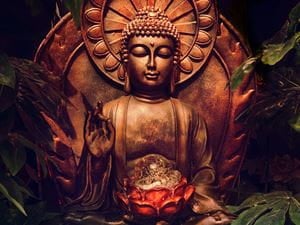
The five rules or precepts of Buddhism are the distillation of Buddhist ethics into their elementary form. The precepts are not rules in the sense of external laws or commandments that may trigger consequences for infractions, but rather steps of enlightenment. Through these forms of self-discipline or internal restrictions, a Buddhist can act in karmic ways that determine a better rebirth. None of these precepts is clear cut or absolute; rather they are all to be practiced with wisdom, or “skillfully.”
The first precept to “avoid taking life.” This is a common rule in almost every ethical system on the planet. For Wiccans, it is “harm none.” For Christians and Jews, it is “thou shalt not murder.” For Hindus and Buddhists, it is ahimsa or “non-injury.” For Buddhists, however, “avoid taking life” prohibits more than harming a fellow human being. In its most extreme practice, it means that a Buddhist will not kill any living creature, not even poisonous snakes or cockroaches. Some Buddhists are vegetarian because of this ethic. Many Buddhists, however, view this as primarily a call to stop killing unnecessarily. Killing an animal for consumption may be acceptable to some Buddhists, while hunting for pleasure would not be acceptable to any. This guideline may also extend to working in industries that promote a cavalier or monetary attitude toward life.
The second precept is to “avoid taking things not given.” Like the first precept, the second precept takes the familiar prohibition against stealing one step farther. Buddhists are also forbidden from taking things that they “found” or that were conveniently “abandoned” by a previous owner. This can also be extended to taking things that someone offers out of a sense of grudging obligation, guilt, or compulsion. The question the Buddhist must ask is, what is my sense of desire and how do I approach money and the privileges that money can buy?
The third Buddhist precept is to “avoid sexual misconduct.” The precept clearly forbids causing any harm to another by infidelity or abuse or sexual addictions, but it also extends to a wide variety of sensual pleasures that can distract and mislead someone from clarity and meditation. Rich food or overeating, excessive entertainment, or gross consumerism could fall into this category.
The fourth precept is to “refrain from false speech.” While this is normally interpreted as a prohibition against lying or bearing false witness, false speech can also be interpreted to cover a wider variety of forms of speech. “False speech” could technically include hyperbole and exaggeration as well. While most Buddhists would not see anything unethical in a person declaring that they hadn’t seen their friend “in forever,” they might disapprove of someone telling their friends that their car is nicer than it really is or that their house is larger than it is in reality. This sort of exaggeration is often harmless, but it builds into larger lies if a person keeps trying to cover for the exaggeration.
The fifth Buddhist precept is to “refrain from intoxicating substances.” This can include drugs, tobacco, and alcohol. It is arguably the precept that the average Buddhist is the worst at keeping, and even deeply devout Buddhists sometimes redefine “intoxicating” in order to allow for the use of substances that are culturally significant or socially expected.
3/7/2023 2:55:48 AM









